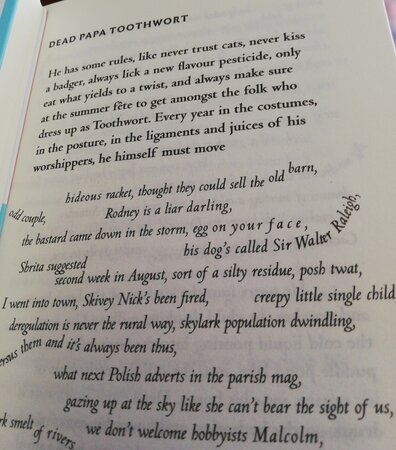In the countryside near London stirs Dead Papa Toothwort, a nature spirit who moves through the different layers of life in the village, and revels in the music of human voices. These curl and overlap strikingly on the page:
Lanny is a dreamy young boy from the village with a wild imagination. Many people can’t work him out, as we hear from his parents, a commuter and novelist who are recent arrivals from the city. We also hear from Pete, a local artist who spends time with Lanny, and seems more on his wavelength than most.
Papa Toothwort understands Lanny, though: he sees that here is someone with an affinity for nature – someone who would respect the deep tales of old, rather than treating them as tourist fodder. As the novel’s first part ends, Toothwort decides the time has come to reassert himself – and Lanny goes missing.
The second section is my favourite part of the book, as the prose turns into a collage of voices echoing Toothwort’s passages in the first part. Max Porter explores not just the relationship between his village community and the natural world, but also relations within the village – for example, the way suspicion soon falls (unwarranted) on Pete.
The theatrical third part turns to the question of what Lanny means to those closest to him – whether they’ll be honest about it or not. It’s the feelings in Lanny that remain strongest in my mind, the way emotions twist and unpeel as the novel goes on.
Published by Faber & Faber.


17th June 2022 at 7:37 pm
Loved Lanny a lot, especially the way the snippets of voices wound around each other.